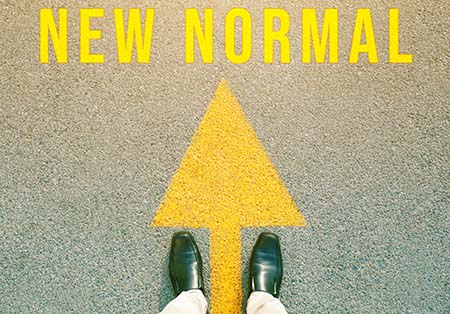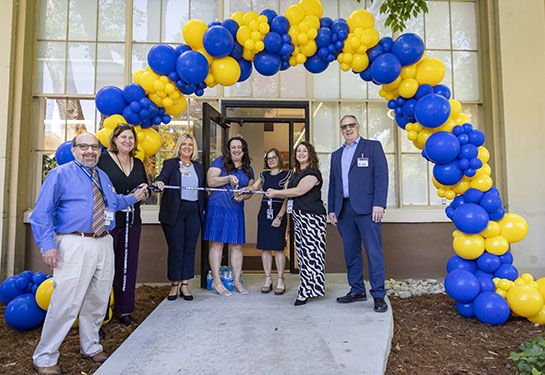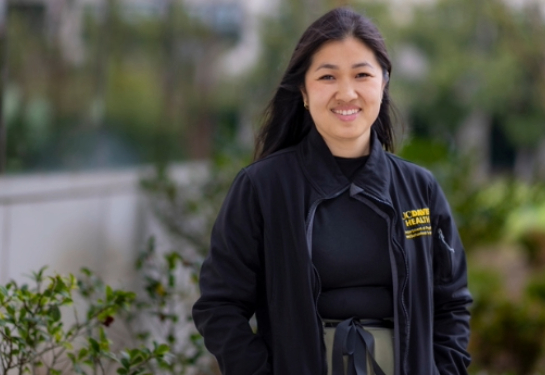A lot has changed during the pandemic. How to navigate our new normal
Chief Wellness Officer Peter Yellowlees offers tips for reconnecting and finding mental health resources
The Plexiglass barriers separating employees from customers are gone from many cafes and shops. Most people aren’t wearing masks in grocery stores or restaurants. And office workers who have been doing their jobs from spare bedrooms and kitchen tables for the last two years are slowly heading back into the office. Everything is starting to look normal. So how come it still feels so strange?
UC Davis Health Chief Wellness Officer Peter Yellowlees explains that one reason for our current stress and anxiety is because we are now living in a "new normal.” Take, for example, our jobs.
“Our jobs have changed. And a lot of these changes will be permanent. There are going to be many people now working in a hybrid way, partly at home, partly in the office or in the hospital,” Yellowlees said.
Don’t expect things to be the same as before
Because the “new normal” is not the old normal, Yellowlees suggests giving yourself some time to talk to friends and colleagues and not expecting everything to be the same as it was before.

“A lot of people, when they come back to work, are going to find it really rather strange and different. So don't get put off if the first few weeks are more difficult than you expected,” he said.
“You are going to have to get to re-know your colleagues, and there may be completely new people that you’ve only known online.” He suggests having coffee or lunch with people. “Find out what other people have been doing during COVID — what's changed in their lives,” Yellowlees advised.
He also notes that there has been an epidemic of loneliness during the pandemic. “We know a quarter of the population has actually been incredibly lonely during COVID. Loneliness is bad for your health — your physical health and your mental health. And, of course, it's going to make it more difficult for those people to come back to work.”
If you recognize that you’ve been lonely, Yellowlees suggests working on it by talking to friends and colleagues. “You need to deliberately increase your social connections. Do some more social things, join some clubs or some groups and maybe get involved in some work activities,” Yellowlees said.
A lot of people, when they come back to work, are going to find it really rather strange and different. So don't get put off if the first few weeks are more difficult than you expected.—Peter Yellowlees
Mental healthcare becoming more technology-based
“People increasingly use apps and other IT-related technologies,” Yellowlees noted. Apps that he recommends to his patients are ones developed by the Veterans Administration and available for everyone on the Veterans Administration Mental Health App Store. “There are 15 to 20 really good apps for a wide range of mental health problems.” One he recommends is CBT-I Coach for insomnia.
“Meditation can be wonderful for mental help,” Yellowlees said. He uses a technique called One Minute Mindfulness. The UCLA Mindful Awareness Research Center offers free guided meditations in multiple languages.
Apps are one way to improve your mental health, but there’s another thing Yellowlees says you shouldn’t overlook.
“One of the best things you can do to improve your mental health is to improve your physical health. One of the problems with COVID is that a lot of people have been baking too much and put on a bit of weight. A key issue now is to get back to the gym, get back to the exercise, and make sure you keep yourself physically fit,” Yellowlees said.
Yellowlees encourages anyone who thinks they need professional help to seek it out. “There are dozens and dozens of definitions of mental health,” Yellowlees said. “But in reality, it’s feeling safe. It’s feeling that you are thriving and that you have friends and good social relationships.”
Tips for navigating the “new normal”
- The new normal is not the old normal, so don’t expect everything to be as it was before.
- Don’t get put off if the first few weeks of returning to work are more difficult than you were expected.
- Get back to exercising! Improving your physical health will improve your mental health.
- Take time to reconnect socially with friends, family and colleagues.
- If you’ve been lonely during the pandemic, deliberately increase your social connections by joining clubs, groups or classes.
- Explore mental health apps, such as the apps available from the Veterans Administration.
- Meditation can be good for mental health, and many resources are available online for free.




